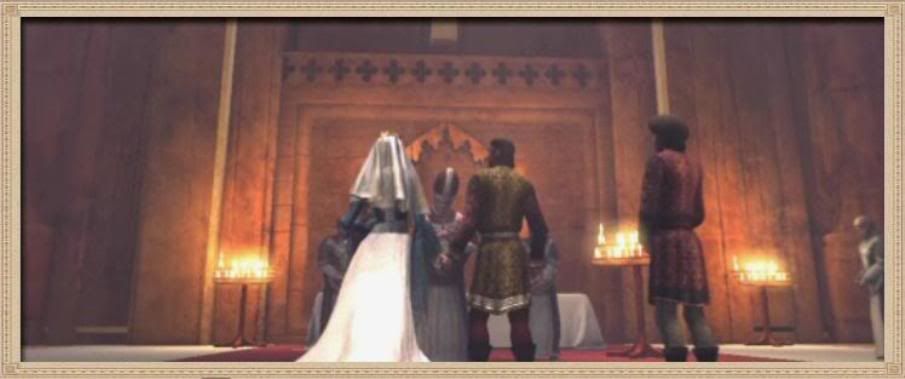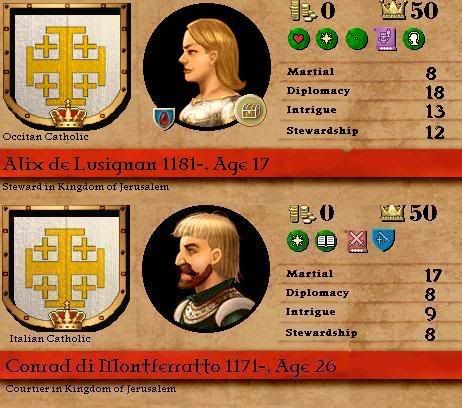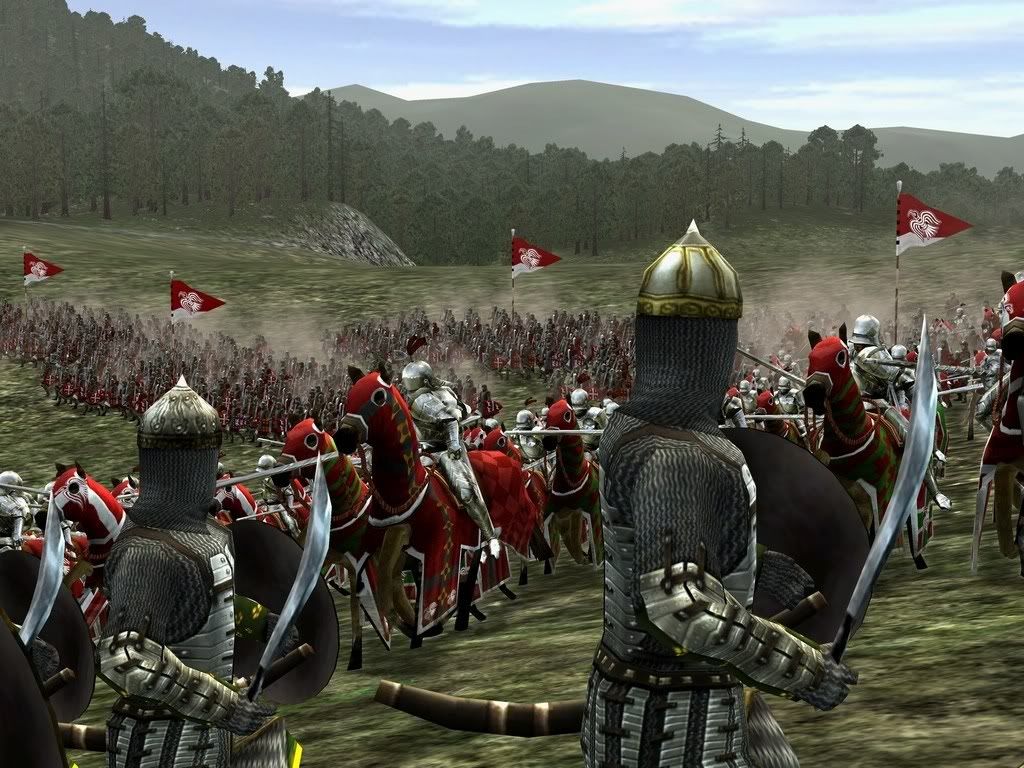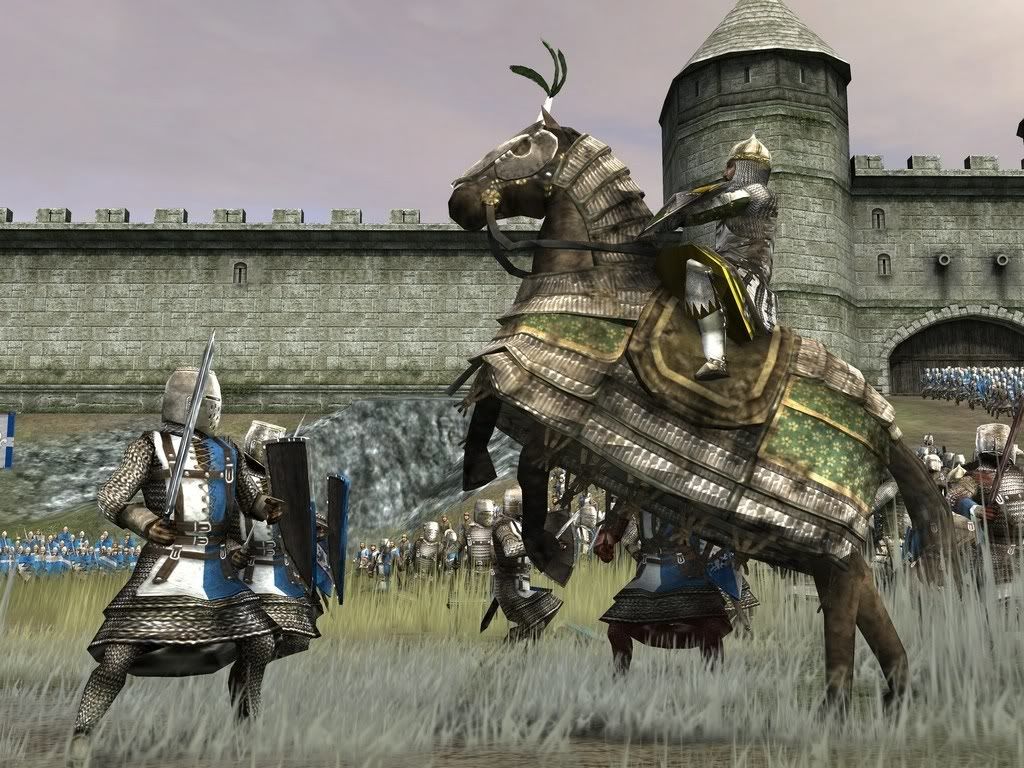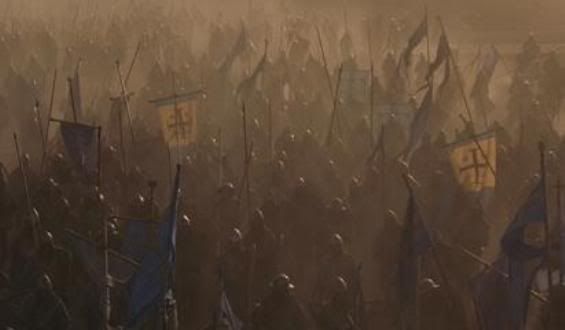THE REIGN OF GUY DE LUSIGNAN (1186-1213)
Part VII: All's Fair in Love and War
All Christendom rejoiced in the news that the County of Edessa had been retaken from the heathens and Joscelin de Courtenay, its rightful lord, was restored to his seat. The new count began to rebuild and strengthen the provinces his father had lost so many years prior. The Edessene Guards with their indigo surcoats and two-handed axes were also restored, with new recruits from those among the new Crusaders who desired a permanent place in the Holy Land.
Unfortunately for Count Joscelin, the venture was not all fun and tournaments. He did a have a strong friend in the aging Reynald de Chatillon, but rapidly made several dangerous enemies, among them Bohemond the Stammerer, Raymond of Tiberias, and even Hospitaller Grandmaster Roger de Moulins – in short, all the great lords of northern Outremer. These men viewed Joscelin as a lackey; he was entirely beholden to King Guy for the restoration of his fiefdoms, and so was much more likely to side with Guy in the frequent arguments between reason and royal whim that plagued the Kingdom.
Thus was the status quo of old Outremer restored. The Counts of Edessa had always been minions of the Kings of Jerusalem, all the way back to Joscelin I, who had been a sycophant of Baldwin II and had received the county when the latter inherited the Kingdom of Jerusalem. Joscelin II had been a weak fool who had lost Edessa to the Saracens, and now his long-bereaved son finally got his chance to reign as Joscelin III. It wasn’t a very impressive heritage, and everyone knew it. With Antioch and Tripoli now probably scheming against Edessa, the King would have to do everything in his power to preserve domestic tranquility and avoid a civil war, though naturally Guy was completely oblivious to the entire affair.
The death of Saladin at the hands of King Richard could not have come at a more perfect time for the crusaders. The demise of the great Sultan threw his realm into utter chaos, as he had held his vast lands together by faith and sheer force of will alone. His successor was his seven-year-old son Mas’ud, whose vassals and neighbors immediately set upon him like vultures on a fresh carcass. The fickle Abbasid Caliph Ahmad al-Nasir, who had nominally been an ally of Saladin, now declared war on his young son seeking easy conquests from a weak ruler. The powerful Emir of Aleppo rebelled, leading his own allies and vassals to fight against his former master. Soon all of Syria was engulfed in war.
Mas’ud sought refuge at his newly declared capital at the holy city of Medina, which had also been the refuge of the Prophet Muhammad. Since Egypt was in the hands of the crusaders and Syria was engulfed in war, a retreat to Arabia seemed a natural choice. However, even Medina was not a safe haven for long, as overzealous Abbasids soon seized the neighboring holy city of Mecca! The remnant of the Ayyubid Sultanate was in extreme duress.
”Hi, I’m Richard the Lionhearted. You may remember me from such crusades as…”
With Saladin dead, Richard the Lionhearted’s primary motivation for joining the Third Crusade was accomplished. Now he at last indulged himself and claimed a territory of his own, namely, Pelusia, on the marches of Egypt and Sinai. However, the Lionheart proved that the acquisition of territories was still not his goal, for he almost immediately gave the province as a wedding present to his favorite sister Joan. Soon after, Richard was called home to subdue a rebellion by his treacherous brother John, whom he had left behind as regent.
In Egypt, Emperor Heinrich consolidated his gains, and slowly conquered the entire country, foot for foot, following the Nile River all the way down to Nubia. Eventually, the only provinces in Egypt remaining outside his control were those occupied by fellow crusaders from other lands.
The Kingdom of Jerusalem was exultant, never more so than on the day King Guy de Lusignan and the victorious crusaders rode in triumph through the city’s Golden Gate. With the Muslims in disarray, Guy decided a well-deserved celebration was in order. The victory banquet coincided with the coming of age of his oldest daughter Alix, who had matured into a truly magnificent specimen of the female gender. Not only was she a brilliant prodigy, but she was also lauded as the most beautiful woman in the kingdom, exceeding even her mother the Queen. It was said that Princess Alix was so charismatic that she could charm the scales off a serpent.
At the royal feast, Alix became acquainted with Conrad of Montferrat, from the retinue of the German Emperor, a handsome knight who had helped to rescue her father after he was unhorsed at the Battle of Giza. Conrad was a tall, blond, muscular crusader and ten years her senior; the princess was immediately smitten. After Alix confided her secret love to her closest friend and confidante, who also happened to be her mother Sibylla, the Queen utilized her own unique talents to persuade King Guy that the best reward he could grant to his savior Conrad would be the hand of his eldest daughter. Conrad was also the nephew of Sibylla’s deceased first husband William of Montferrat, who had been a real heartthrob, and the Queen was anxious for her daughter to enjoy the same delights of younger life that she had experienced herself. And so the two were married on the feast day of Saint Valentine, 1197, amidst myriad shouts of acclamation. After the ceremony, Guy offered his lucky son-in-law the title of Constable of the Hosts of Jerusalem, second-in-command to Gerard de Ridefort.
Rumor rapidly spread through the courts of Outremer that God Himself had rewarded Conrad a hundredfold for his personal sacrifice in going on the Crusade. Sibylla had taught her daughter well, and the passions of Alix de Lusignan quickly became the stuff of legend, though the only man who knew for sure kept a smile on his face and his lips tightly sealed. The rumors were augmented at Conrad’s announcement the next month that the princess was with child. Queen Sibylla had taught her daughter well indeed.
Also moderately noteworthy at this time was the arrival of a new royal fosterling, Anastasia of Armenia, the daughter of Prince Leon. Anastasia was a sly, strong-willed girl of nine and had been sent by her father to seal his pact of eternal friendship and vassalage to the king. She could also conveniently act as Leon’s eyes and ears in the royal court, for though the Prince of Lesser Armenia owed King Guy a great debt of gratitude, that certainly did not mean that he was not seeking ways to better his own situation.
Having spent the better part of two months feasting and frolicking, King Guy seemed to forget entirely that he was on crusade. After all, it wasn’t as if he’d traveled hundreds of miles from Europe just for that specific purpose; he was already there! So naturally, he was taken by surprise when a Muslim prince proved there was still some fight left in the Ayyubid Sultanate. The Emir of Damascus was one of the most powerful vassals of the Sultan, and one of the few that had remained loyal to Mas’ud in the wake of Saladin’s death. Surrounded by traitors and cowards, the Emir took it upon himself to personally avenge his fallen master by calling a Jihad on the Kingdom of Jerusalem. His first target was the crusader fortress of Safed, which he placed under heavy siege.
Having barely completed his wedding week, Conrad of Montferrat found himself thrust back into the saddle. The aged Gerard de Ridefort was ailing, and King Guy was ill from indulging in far too much drink. So the task fell to Conrad to oust the Saracens from Safed. Running short on time, he rode out with only the Jerusalem Levies and a portion of the Royal Guard. Young Princess Alix followed the host to the gates of Jerusalem, wailing and weeping like a madwoman, at last falling to the ground as her beloved rode out of sight.
Her womanly fears proved to be in vain, however, for at the fortress of Safed, the new Constable of Jerusalem proved himself to be a military genius. Hiding his men in the hills, Conrad sent a handful of fleet-footed men to scout out the five Saracen camps surrounding the city. After hearing the scouts’ report, Conrad realized that though the Saracens outnumbered his men altogether, they were spread out thinly around Safed to maintain the siege and were thus weaker at any given encampment. He resolved to attack the largest camp in a night ambush, evocative of the ancient raid of Gideon’s brave three hundred.
The sudden blast of Frankish trumpets awakened the weary Damascenes to the presence of their enemies, but they were swiftly overrun and their camp was put to the torch. The din of the ferocious skirmishing awakened the other Muslim camps, as well as the embattled garrison of the city, and the situation became immediately confused. It was as though Pandora had just opened her box in their very midst. In one of the other Muslim camps, the Emir of Damascus sent dispatches to his commanders to retreat and regroup. The more quick-witted officers obeyed, but one captain’s force was caught between Conrad’s night raiders and the sallying garrison of Safed and crushed in a classic hammer-anvil maneuver.
The Saracens pulled back to Damascus and Conrad sent word of a great victory to Jerusalem. However, the remaining Ayyubid lords were impressed by the boldness of the Damascene Emir and slowly began to rally to his defense. The situation was temporarily stalemated until Conrad could receive reinforcements.
Fortunately, King Guy was aroused from his alcoholic stupor, (some say that Queen Sibylla and Princess Alix marched into the royal bedroom, dumped buckets of cold water on his head, and gave him a tongue-lashing the likes of which mortal man has never seen) and proceeded to call his vassals back to war and the crusade. The Emir of Damascus contemptuously sent insults to taunt Guy, calling him “the infidel son of Satan and a motherless goat, with a face like an old sow and the heart of an emasculated devil.” Guy was incensed, but the insults couldn’t make his cumbersome army march any faster.
The Jutland Raiders, a Danish mercenary company led by Lord Knut, the nephew of the King of Denmark, requested the privilege of joining the Royal Host, for a modest fee, of course. The Danes were tall and brawny, and armed with big two-handed axes that could split a man and a horse in two with one stroke.
”More Franks?” “No, these people are Danes.” “Crap.”
Guy and Gerard led the men of Jerusalem north to Safed, where Conrad’s veterans rejoined them, and then the combined Royal Host marched to Damascus. The Second Crusade had tried and failed to take the city, and Guy resolved that the Third Crusade would be different. More importantly, he wanted to show himself the equal of King Richard of England, for whom he still harbored a great jealousy. The Emir had already evacuated most of the inhabitants of the city by the time Guy arrived, and so the city was occupied only by desperate Saracen soldiers. Damascus was thus laid under siege, and Guy’s army was soon joined by the forces of Raymond, Bohemond and Joscelin. And so the Siege of Damascus became the first military venture of the four great realms of Outremer: Jerusalem, Tripoli, Antioch and Edessa, now united under the banner of King Guy.
Growing impatient of the long siege, hearing word of Syrian reinforcements under the command of the young Sultan’s Grand Vizier, and prompted by Conrad, Guy decided at last to storm the walls. The assault was quick and bloody, for the Emir knew the end was near and led his Damascenes out to glorious martyrdom in a final charge. The Damascene Muslims fought bravely, but without the support of their co-religionists, they were swiftly cut down.
Edessenes cut down the Emir at the Siege of Damascus.
It was the newly declared Edessenes who actually slew the Emir of Damascus near the gates of the city, a proud boast for Count Joscelin who for so long had cringed in humiliation of his father’s defeat. The city was looted and burned, but most of the famous wealth of the city was gone since most of the inhabitants had already been evacuated. So the great Damascene Jihad of 1197 ended at last in a surfeit of fire and blood.
Jubilation broke out at the crusaders’ Christmas festivities when word arrived from Jerusalem that Princess Alix had given birth to a healthy son, whom she had named Barisan. Both Guy and Conrad were delighted by this news of their progeny, though it made Conrad especially anxious to return home to his young bride, a desire that would not be fulfilled for many months…
The tenuous peace was not to last. Inspired by the deeds of the fallen Emir, the neighboring Sheik of Al Mafraq called for his own Jihad in the spring of 1198. The Ayyubid Grand Vizier Umaya Abbas urged caution, counseling unity against the Franks instead of haphazard piecemeal attacks, but the Sheik’s lust for blood would not be satiated until King Guy was dead. He and a small coalition of allies launched a counter invasion against Damascus and Safed, which were both besieged since the northern lords of Outremer were already marching home. Hearing of the new Mafraqi Jihad, the Tripolitanians, Antiochenes and Edessenes immediately turned around to rejoin the fight.
The Mafraqi forces consisted of poorly armed peasants led by a bloodthirsty zealot, and were swiftly defeated at Safed by Raymond of Tiberias, and at Damascus by Conrad of Montferrat. Mafraq itself fell easily to the men of Reynald de Chatillon, who mercilessly slaughtered the inhabitants and stole everything of value. The Sheik of Al Mafraq’s severed head was sent to Sultan Mas’ud on a pike as a birthday present with compliments from his majesty, the King of Jerusalem. The Saracens were horrified at such barbaric behavior, and at last the forces of the Sultanate united to drive the accursed Frank from their lands. The last survivors of the Egyptian army joined their Syrian and Arabian counterparts under the banner of the Ayyubid Sultan, though the army itself was led by Grand Vizier Abbas.
However, the vanguard of the so-called “united” Saracen army marching to retake Damascus was waylaid by none other than the Emir of Aleppo, who had been in open revolt since the death of Saladin. The Aleppans wreaked havoc on the unwary Saracens before disappearing back into the desert.
Hearing of the coming Ayyubid invasion, Guy led the vast allied hosts of Outremer south to meet them. The two armies encamped many miles northeast of Damascus near the ruins of ancient Palmyra, preparing to conclude the holy war with a last, all-important struggle of faiths and wills. Both hosts were surprised to learn of the arrival of a third army, led by the Emir of Aleppo. The commanders waited with baited breath to learn who the Aleppans would be supporting. Would they come to the aid of the beleaguered Muslims of Syria, or would they aid the Franks in the overthrow of their former lords? Impatient as always, Guy sent messengers to the Aleppan camp with a proposal of alliance against Sultan Mas’ud.
The Emir’s reply was curt and cold: “Accursed Frank, as you do to others, so let it be done also to you!” The message was accompanied by the heads of Guy’s emissaries. The King raved and swore in his wrath to destroy both Muslim hosts.
The Battle of Palmyra thus began during a sandstorm on a hot summer’s day in the Year of Our Lord 1198. It was a battle of three armies: the Christians of Jerusalem against the Muslims of Syria against the rebellious Muslims of Aleppo.
Banners waving, the Hosts of Jerusalem prepare to fight at Palmyra.
The Crusader host was large and unwieldy, with Gerard’s Templars holding the left flank, the combined hosts of Guy, Raymond, Bohemond, and Joscelin in the center, and the Knight Hospitaller and Danish mercenaries on the right. Wanting to take Guy’s head as a prize, the Emir of Aleppo committed most of his forces to an attack on the Christian lines, sending out skirmishers on his rear to hold off the Egyptians and Syrians.
The impetuous Jutland Raiders began the actual combat, roaring into the Muslim flank, their axes swinging. Not to be outdone, the Knights of Outremer launched an all-out charge on the Aleppan center, breaking through at great cost of life only to crash directly into an Ayyubid counter-charge coming from the opposite direction. Lances were splintered and swords drawn as the battle intensified. The Knights managed to capture the Emir of Aleppo, but were in turn swiftly being outfought by the ferocious Ayyubid Saracens.
With their Emir captured, and the Crusaders and Ayyubids fighting desperately in what had been the center of their lines only moments before, the Aleppans buckled and broke. The Knightly Orders on both of the Christian flanks easily rode down the routing fragments of Aleppo’s army. In the meantime, the Crusader knights in the center were hard pressed by the Syrian spearmen and horse-archers, being cut off from their own Christian infantry due to their reckless charge. Constable Conrad led a few men in a sortie to open a gap for the infantry to come to the aid of the embattled knights, though he received a painful wound in the shoulder in so doing.
Seeing that King Guy’s life was in danger, the Danes turned from chopping up the Saracen flank to save their paymaster’s life. They united with the oncoming Frankish infantry, now led in the front by Conrad astride his great white stallion. Under heavy strain, the Saracen host began to fall apart. Vizier Abbas turned and fled, which signaled his army that the battle was lost. The Saracen horse archers covered the retreat, peppering the crusaders with arrows so that the Muslim survivors could escape the fury of the surviving Christian knights.
Thus was the Battle of Palmyra almost a Pyrrhic victory for the Christians. The Emir of Aleppo was a prisoner and his army scattered to the four winds, and the Ayyubids were in full retreat. However, this success came at great price to the crusaders. Raymond of Tiberias, Gerard de Ridefort, and Conrad of Montferrat all received terrible wounds. Joscelin of Edessa and Knut of Denmark were dead, cut down in the heat of battle along with much of the flower of Christian knighthood. Guy de Lusignan himself had very nearly been captured by the Saracens, and was only rescued at the last minute through the personal bravery of Conrad and the Jutland Raiders. Nevertheless, a victory was a victory, no matter how near a thing it was, and the crusaders relished their triumph even while nursing their many wounds.
Hearing of the catastrophic defeat of both his own force and the rebel army from Aleppo, and grappling with the treacherous Abbasid Caliph al-Nasir, whose armies were still ravaging Arabia, the child Sultan Mas’ud begged King Guy for peace at any cost. Guy agreed, under certain conditions, namely that the Sultan must forever renounce his claim to all lands taken from him by the crusaders, and pay an annual tribute for the space of five years. The Emir of Aleppo was ransomed by his subjects, though it took them six months to raise the requisite amount, during which time the Emir languished in a Christian dungeon. Thus did the great Third Crusade at last come to an end in January 1199.
King Guy made his brother Geoffrey de Lusignan the Prince of Damascus, another unwittingly brilliant move, as it removed two hated members of the royal court to a border province that would require both a great deal of rebuilding and a lot of careful defense. Rumor said that the Lady Orengarde nearly wept as she handed the keys to the Royal Chancellery over to her successor, Princess Alix, before departing to meet her husband in Damascus. The Lusignan family holdings were rapidly increasing in Outremer, with Guy reigning in Jerusalem, Amaury in the Sinai, and now Geoffrey in Damascus.
With the Muslim threat finally neutralized, at least for the time being, the Franks at last had the time to rebuild Damascus as a Latin Christian city and new crusader state. The Grand Umayyad Mosque had its crescent replaced with the Christian cross and was renamed the Church of St. Paul after the great Apostle who was converted there. This dealt a terrible blow to the morale of the Syrian Muslims, as the Umayyad Mosque was where many Muslims had first gathered to mourn the loss of Jerusalem in the First Crusade. Now, one hundred years later, Damascus too had fallen to the indomitable Franks, and the Umayyad Mosque was now a Christian church.
In Edessa, Joscelin’s eldest son Guillaume succeeded the slain crusader. It was tremendously ironic that having only just retaken his home after waiting so many years, Joscelin should now find himself called home to meet his Maker. This situation was agreeable for the other northern lords, as the despised Joscelin was dead, and Guillaume was a bitter, sickly youth, who blamed God for his family’s misfortunes. The lad did not look terribly promising, but a weak Edessa was exactly the sort of neighbor that Raymond and Bohemond preferred.
The Year 1200 saw the Kingdom of Jerusalem stricken by a terrible famine; the years of crusade had not been kind. The soldiers had been unable to sow their crops while on campaign, and those peasants who had remained behind had had much of their food stolen by foraging armies. Feeling pious after his new victories, and perhaps even a tinge responsible for the blight of the people, Guy agreed to alleviate the famine out of his own pocket with funds obtained in his victorious crusades. Queen Sibylla was quite impressed with Guy’s uncharacteristic display of mercy, and rewarded him suitably as only she could provide.
Perhaps the greatest surprise of King Guy’s entire reign came on May Day, 1200, when Reynald de Chatillon announced that he was retiring from public life to end his days as a monk. He explained that as he was now nearing the twilight of his life he had grown tired and reflective. With Saladin dead and the Saracens defeated, he felt his existence had waxed somewhat hollow. Since his life’s goals were now fulfilled, Reynald thought it appropriate to trade his warrior’s armor for the habit of a pious cleric, and to end his days in prayer. Not having any sons of his own, Reynald appointed his friend Humphrey de Toron, husband of Sibylla’s younger sister Isabella, to succeed him as the Prince of Oultrejordain. Thus was the life of the most bloodthirsty lord in all Christendom punctuated with the peaceful quietude of hermitage. It is still said amongst the people of Jerusalem that stranger things have never happened. Later reports said that the Pope himself had a heart attack and died of the shock when he heard the news, but these rumors were largely unsubstantiated.
”Just call it force of habit…”
Meanwhile, in Egypt there began to be whispers of a succession crisis as the life of Emperor Heinrich drew to a close. He had conquered most of Egypt in the last few years, but had been gravely wounded in the Siege of Aswan, and never truly recovered. His wound festered instead of healing, and his health continued to deteriorate. Not having a male heir, Heinrich knew that the Holy Roman Empire would likely pass to his namesake nephew, a miserable foolhardy child. Desiring his line to continue in some corner of the world, Heinrich crowned his only daughter Frederica the Queen of Egypt. This move was incredibly controversial in Europe, but the new Queen had the support of the Teutonic Knights and the blessing of the Emperor. Heinrich soon breathed his last and was indeed succeeded as Holy Roman Emperor by his nephew.
Thus the eyes of the Christian world were again diverted from the modest successes of Guy de Lusignan to focus on the deeds of greater monarchs. After Saladin’s well-timed death at the hands of King Richard, Emperor Heinrich had almost single-handedly carved a new crusader kingdom from the harsh desert sands.
The Latin Kingdom of Egypt was divided into three great duchies, a European feudal unit heretofore unseen in the Near East. The most northerly provinces and much of the Nile Delta were ruled by the Duke of Alexandria. One of Queen Frederica’s ladies-in-waiting held the Faiyum and most of Lower Egypt as the Duchess of Cairo. Finally, Nubia and Upper Egypt were held by the Duke of Aswan. These German nobles were all vassals to the teenaged Queen Frederica, their liege-lady, who held many important lands and cities herself.
The only Egyptian lands not beholden to the Crown were the Counties of Alexandria, Damietta, and Pelusia. The city of Alexandria had been retaken from Saladin by the Magyar crusaders, and was now ruled by the King of Hungary’s brother, a fact that was particularly galling to his neighbor, the German
Duke of Alexandria. Damietta was Philip of France’s great prize, and he had relocated his mistress to reign there as its Countess in order to save face at home. The new Archdiocese of Cyrenaica was also beholden to Philip of France, though it was not technically in Egyptian lands. Pelusia, Richard the Lionhearted’s token conquest still remained a part of the personal demesne of his favorite sister Joan, who was now the Queen of Sicily, he having given the county to her on her wedding day.
Thus was Egypt the birthplace of many new crusader states.
Frederica von Hohenstaufen, the new Queen of Egypt, had the fiery red hair of her namesake grandfather, Friedrich Barbarossa, but that was where their similarities ended. Frederica was a lustful, arrogant woman, intellectually brilliant yet utterly debauched. She began her reign by planting vineyards and pleasure gardens for herself, spending much of her inheritance on luxurious clothing and expensive jewelry, and some even whispered that she maintained a reverse harem filled with exotic male slaves that she called “her pets.” She even styled herself on occasion as “Pharaoh” and “Cleopatra Reborn.” Stories of her licentious court scandalized decent Christians: she openly conversed with Saracens, even appointing some of them to important court positions without forcing their conversion, she created a new Royal Guard comprised entirely of women warriors, she reputedly held court in the nude whenever it suited her, and some actually claimed (though these rumors were especially absurd) that she loved to read!
So Guy de Lusignan found himself overshadowed by a mesmerizing young diva to the south, who ruled an important crusader kingdom in her own right, entirely independent of Jerusalem. The Latin East just got a lot more complicated.
Guy decided that he needed to develop his kingdom’s infrastructure in order to keep up with all the racy tales coming from across the borders in Egypt. After all, he couldn’t win glory through yet another war – many of his best knights had died in the wars already, and the next generation was still too young. Fortunately, the successful Third Crusade had provided him with plenty of cash. In the Year of Our Lord 1201, King Guy improved the infrastructure of the kingdom, building schools, roads, harbors, and fortresses to improve the quality of life of the people and protect against the myriad bandits that still plagued the wastelands. He also paid alms to the struggling clergy and enriched the Church of the Holy Sepulchre. Pilgrims flocked there in droves to see the Blade of the Lionheart, the relic which had drained the lifeblood from the heart of the great Saladin. The stability of Guy’s realm thus improved rather drastically, considering the fact that many of the royal vassals were still of questionable loyalty and most of the peasantry were Muslims.
The Year 1201 was also marred by tragedy, for the aged Grandmaster Gerard de Ridefort perished from the effects of wounds received on crusade. He was succeeded as Marshal of Jerusalem by the incomparable Conrad of Montferrat, who had more than proved himself worthy of the honor. Before his passing, Gerard whispered some last words of wisdom in the ear of King Guy, “Before beginning any great undertaking, always ask yourself, ‘Would Reynald do this?’ If the answer is yes, then for the Love of God, my King, don’t do it!”
In the Year 1202, having suppressed his brother John’s rebellion, Richard the Lionhearted returned again to the Holy Land, this time bringing his teenaged nephew Arthur, son of his dead brother Geoffrey. Arthur had been the heir to the lordship of Brittany, but since Richard had renounced the Plantagenet claim to Brittany in order to end the war with France and thus commence the crusade, Arthur was unfortunately disinherited. While visiting the Holy City, Richard wondered to Guy if there was a place in the Kingdom of Jerusalem for Arthur, so that the poor lad could start a new life in a new world. Mainly to look magnanimous in front of the great English King, Guy loudly announced to the entire court that of course there was room for young Arthur. The boy would have the finest of educations, and would receive a position of great importance in the royal court and the King’s own daughter to be his wife.
So Arthur Plantagenet married Princess Marie, Guy de Lusignan’s second daughter. If Alix favored her mother, Marie definitely took after her father. Where her sister was slender and lithe, Marie was buxom and brash. She did not especially excel in any specific field, but she was still strong and vigorous, and the young grandson of Henry II and Eleanor of Aquitaine seemed to have a genetic predisposition towards a preference for feisty women anyway. The unusual marriage was thus somehow a happy one. The King was especially pleased with his new son-in-law, and appointed the young man steward of the kingdom. Arthur proved quite popular in Jerusalem’s social circles, always ready with a fresh anecdote of Plantagenet intrigue, and he became fast friends with young Crown Prince Godfrey.
In the Year 1199, Guy de Lusignan had declared the Third Crusade officially over as a condition of his treaty with Sultan Mas’ud. Now, in 1202, Arthur’s uncle King Richard declared that the Third Crusade in fact wasn’t over – he hadn’t finished yet, so he “undeclared” the crusade over. With Queen Frederica’s permission, Richard led an expedition south along the Red Sea, and landed in Arabia. “Since
I have not made peace with the Sultan,” said Richard, “Unlike some others, I remain at war!” The Lionheart then proceeded to capture the Muslim holy city of Medina, which was also the new capital of the Ayyubid Sultanate. Mas’ud barely escaped with his life to neighboring Al Jawf, and Richard proceeded to plunder Medina of his riches and establish a crusader state there. The newly established and strenuously maintained peace in the Near East began to teeter once again on the brink of all-out holy war.
As 1203 began, Jerusalem was struck by quite a different controversy. Prince Godfrey, heir to the throne, was found in the bed of Anastasia of Cilicia, only child of Prince Leon of Armenia and ward of the crown! She was only fourteen years old, and Godfrey a mere thirteen! Obviously she had led Godfrey into such unacceptable behavior, as the Crown Prince was far too innocent to dream up such carnal acts on his own. Nevertheless, their sin required the severest of punishments, and Guy drummed up the harshest consequence he could possibly think of for their actions: marriage! Godfrey and Anastasia were immediately declared betrothed, but as another condition of their punishment, they were not allowed to consummate their relationship again for a period of three years, which was to be very strictly enforced by order of the King. They would not share living quarters, and they would rarely see each other until Godfrey’s sixteenth birthday, which would also be their official wedding day.
Word was sent to Prince Leon of this royal sin, but the Prince didn’t seem upset in the slightest. In fact, or so the messenger said when he reported back to Guy, Leon seemed quite pleased. Guy thought it very noble of the Armenian Prince to put such a brave face on a bad situation, but Queen Sibylla had other thoughts. Was it really just a coincidence that the Prince of Armenia’s only daughter had seduced the King of Jerusalem’s only son?
And Leon had also just had a wedding of his own, Anastasia’s mother having died of an illness the year before. Leon’s new bride was none other than the daughter of Isaac of Cyprus, the False Emperor, a very dangerous man to be related to indeed. There was much more going on here than met the eye. Sibylla resolved to watch the new Princess Anastasia very closely.
As of 1203, with one grandson born, two daughters pregnant, and a son betrothed, the Lusignan royal dynasty had truly grown and prospered, and frankly, it scared the hell out of King Guy.



